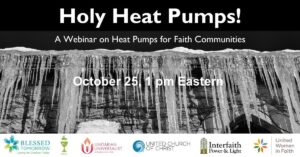-
Holy Heat Pumps! A Webinar on Heat Pumps for Faith Communities
- Posted on October 10, 2023
- by Sarah Marino
- in Environment, Latest News
- Comments Off on Holy Heat Pumps! A Webinar on Heat Pumps for Faith Communities
 With cooler weather approaching, we’ll all be firing up our heating systems – and just in time for Halloween, we can all be spooked by the spike in our energy bills! Heat pumps are a great way to lower those bills at your church and care for our Sacred Earth at the same time.
With cooler weather approaching, we’ll all be firing up our heating systems – and just in time for Halloween, we can all be spooked by the spike in our energy bills! Heat pumps are a great way to lower those bills at your church and care for our Sacred Earth at the same time.How we cool and heat our buildings is a significant part of how we address the climate crisis. When it comes to Heating, Ventilation, and Air Conditioning (HVAC) systems, heat pumps are a crucially important technology in the transition away from fossil fuels. This webinar will explain how heat pumps work and how to lower the costs for installation at your congregations with the new government funds available to congregations for the first time.
Panelists will include Colby May and Jim Brown from Energy for Purpose to explain the types of heat pumps and their applications in various settings, and John Agan, a policy analyst from the Department of Energy who will give us updates on the federal funding for both types of heat pumps.
We will hear a success story from a certified zero-emissions Cool Congregation. Jim Fritz at Good Shepherd Lutheran Church in Decorah, Iowa will share how they installed air-source and ground-source heat pumps that together with their solar, help them achieve zero emissions.
Finally, we will address frequently asked questions, such as, “What do you do with a building that has radiator heating?”
Register here for the heat pump webinar on October 25th at 1 pm Eastern.
This webinar is cohosted by the Rev. Dr. Brooks Berndt, who serves as the Minister of Environmental Justice for the United Church of Christ, and Sarah Paulos, who serves as the Community Engagement and Programs Director for Interfaith Power & Light.
Other faith partners include United Women in Faith, the Unitarian Universalist Association, Blessed Tomorrow, and Green Chalice.
People of faith and conscience like you are caring for our sacred Earth by leading the way to a cleaner energy system that safeguards the health of our children and all future generations.
With deep gratitude for your actions in caring for our common home,
Sarah Paulos
Program Director






